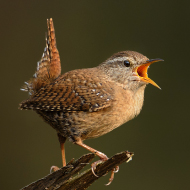
RSPB event to raise awareness of declining bird populations
Commuters, shoppers and office workers across the UK today (17 October) will be greeted by the sound of soothing birdsong.
Westfield Shopping Centre, Co-op stores and transport hubs including the London Underground are among more than 5,000 unexpected locations where the event will be taking place. Added to this will be organised community events where people can get together with family and friends and enjoy the relaxing sounds of nature.
The Let Nature Sing Takeover is being held by the RSPB to raise awareness of declining bird populations in the UK, along with losses seen in much of the UK’s most loved wildlife.
It comes in response to new figures which reveal that, for UK adults aged 18-44, addressing climate change and the environment is the number one issue for today’s politicians to secure the long-term legacy of their government.
The RSPB hopes that, following its summer top 20 chart hit Let Nature Sing - a music track of pure birdsong - it will once again bring birdsong back everyone’s life, acting as a reminder of what could be lost if the crisis facing nature is not addressed.
RSPB’s director of communications, Rebecca Munro, said: “Earlier this year Let Nature Sing got the public talking about what birdsong means to them and the shocking fact that the UK has lost over 40 million birds in just half a century. We all need birdsong in our daily life, but our natural world is in crisis, our wildlife is falling silent.
“This summer there have been deeply concerning reports and warnings published by IPBES and the IPPC. And the State of Nature report has revealed that a quarter of our mammals and half of the UK’s bird species are threatened with extinction.
“When looking at the evidence it is no surprise to see that more people recognise that something is not right with our natural world and that the public feel strongly that addressing climate change and the environment should be a top issue for today’s politicians looking to create a legacy future generations will be proud of.”



 The Animal and Plant Health Agency (APHA) has updated its online reporting service for dead wild birds.
The Animal and Plant Health Agency (APHA) has updated its online reporting service for dead wild birds.